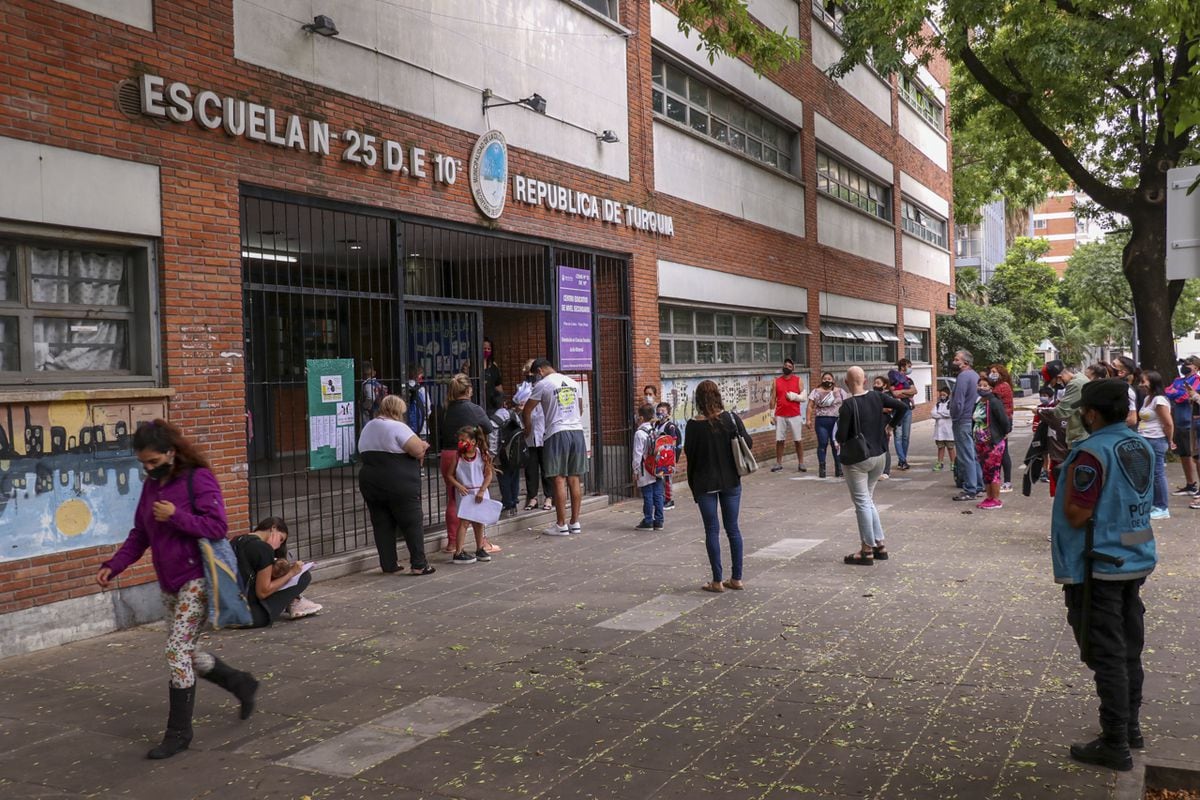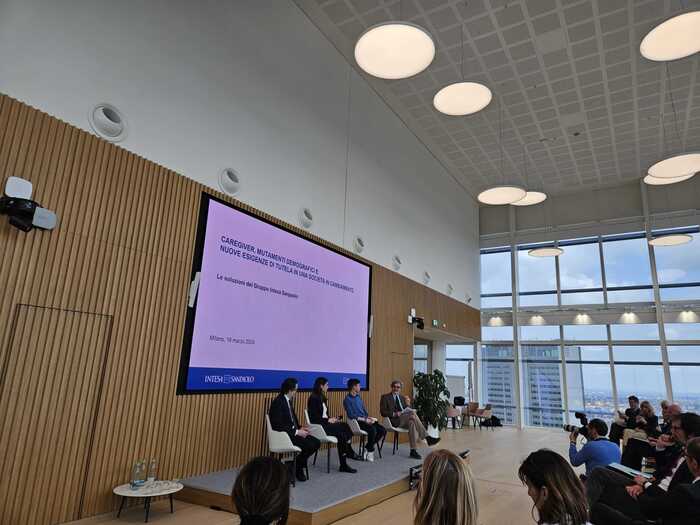- This week data from the 2022 population census came out in Argentina and it is worth remembering that demography plays an important role in the economy. Because?
- Demography is people.
How much is it, how old is it, how is it spatially distributed, how fast is it aging and being born.
They are all factors that impact the economy.
Take aging for example.
Each time we are a little older as a society and the pattern of consumption changes: Argentina is aging and that means that we demand more geriatricians than pediatricians, more caregivers for the elderly than teachers.
It also alters the form of production because the productivity of an aging society is different from that of one that is not.
He said the geographical question and there appear large cities versus small ones.
Anyway.
- How easy or difficult is it to alter demographics and their dynamics with public policies?
- Quite difficult.
Demography is three things: people who are born (fertility), who move (migrate or immigrate) and who die (mortality).
Studies show that public policies, beyond progress, are not so decisive.
Families have the number of children they want.
When a public policy is designed to shape that, a gap is produced between the children that families want to have and those that they actually have.
Ceaușescu's Romania or Mao's China in which there was a militancy from the State against people deciding their fertility.
In migrations, perhaps there is more incidence with public policies.
"Demography is the people. How many, how old they are, how they are distributed spatially, how quickly they age and are born. These are all factors that impact the economy."
- The published information of the 2022 Census is not yet complete. What can you tell us so far about these three points?
- Bit.
It gives only some indications of migrations because the total population by department at the country level appears.
But there is no information on the structure of the population by age and in the census there were questions on fertility.
We do not have those answers and we must wait to corroborate the trend that we see from the vital statistics published by the Ministry of Health every year: in recent years adolescent fertility has fallen by 55%.
In CABA almost 80%.
-
Strong
.
- A lot.
Fertility was almost stable for several decades until 2015.
- What happened?
- First, an important cultural change in the last decade in Argentina.
The young women decide to go about their lives unmolested.
The change also goes through public policy such as comprehensive sexual education, which has been coming since mid-2010 and the adolescent pregnancy plan since 2017.
"The two best indicators of development that exist are perhaps that fewer people die and that women have the number of children they want"
-What does it mean that fewer people are born?
- That the population ages.
The old are still alive and there are fewer kids.
- And is that good or bad for the economy?
- Not good, very good.
Perhaps the two best indicators of development that exist are fewer people dying and women having the number of children they want.
The aging of a population is the result of a process of development and advancement.
Thus, societies that develop age.
Of course, challenges are generated for public policies and the economy: if the population ages a lot and the institutions do not change, there is an excess of dependent population.
- So we can get old and stay active for a long time?
- It's the challenge.
But how is it resolved?
First let's define what it is to be old.
It is very different to be old 100 years ago, to be old today and 100 years from now.
Our health is greater and jobs are less physically demanding.
-But the idea of how young people are going to do tomorrow to support retirees who are active today is dizzying.
- The question does not go through aging itself but because the GDP per capita grows and what must be achieved is to reverse the latter, something that has not been happening in recent decades in Argentina.
It is the macroeconomic dynamics that must compensate for future demographic problems and this is done by making productivity grow faster than the population ages.
"We do not know what the level of poverty and unemployment is in Pergamino"
- If an older population demands fewer teachers. Do we have to change the school?
- Let's just say he gives us a chance.
In 2020, 33% fewer boys were born than in 2015. This means that in 2026, when these boys are 6 years old, 33% fewer boys will enter schools than in 2021. Demand for education falls.
If the problems are in teacher training, perhaps it is time to say "let's stop the ball for a minute, let's train fewer teachers because we have fewer kids but we can train them better and pay them better."
Today the supply of teachers is of low quality.
- How is Argentina in relation to its neighbors in terms of its young population and preparation for the labor market?
- Most of the South American countries have more university graduates per inhabitant than we do.
Two decades ago we were first comfortable.
- Is it surprising that the results of the census are not yet?
- The publication plan is not being met and I am concerned that there is not a clear public explanation of why all the results are not coming out.
After 90 days, what was published this week would come out and the complete data would be in December.
It didn't happen.
- Does what happened to the figures in La Matanza worry you? [NE: the 2022 Census showed that the population growth in that municipality was 22.59% lower than projected based on the 2010 census data]
- The problem was 2010. This was one more sample of that manipulation disaster that was made in INDEC.
- What do you think of the INDEC situation?
- He has been in trouble for a long time.
In 2006 a modernization process had begun.
In 2007 and 2008 it was cut with the intervention.
In 2016 he began a work that he would call heroic.
The level of tension inside that building was strong and Jorge Todesca's team regained credibility for the organization that Marco Lavagna continued.
In terms of development, however, I think there are challenges within INDEC and outside of it.
- For example?
- We are the only country in the region, and I stress, the only one, that the Permanent Household Survey that measures poverty and unemployment is not national.
- It's urban
- Not even, there are 31 agglomerates.
- Would it cost a lot to make it national?
- It is done all over Latin America.
It is complex, it is a task, but it is faced.
The project is there but it has not finished happening.
We don't have the slightest idea of what the job market is like in small cities or towns in Argentina.
Everything we say about poverty in this country is about the 31 most important agglomerates and it is not the same to talk about the city of Formosa as it is about the province of Formosa.
- We do not have a complete map of poverty in Argentina and the Pope spoke of 52%
- We do not know the level of poverty and unemployment in Pergamino.
- It's like that phrase from the mayor of Avellaneda, but from Santa Fé, (Dionisio Scarpin) who said "The State cannot cut the grass on Route 11, how is it going to manage a company like Vicentin?"
- Exactly.
The State cannot even measure unemployment in Pergamino and it is very problematic.
INDEC, for example, does not have a Big Data strategy.
Perhaps this census was an attempt to advance that and the idea of making it digital, for example, is very good.
- What happens with the information that is generated outside INDEC? One sometimes feels that more and more data is filled and yet they all appear in fragmented databases.
- You refer to the registration data.
Records in Argentina are bad or inaccessible.
There are two sources of information on people in Argentina that are, within everything, of good quality.
ANSES and AFIP.
None gives information when trying to evaluate a tax reform or whatever.
- And is that right or wrong?
That's wrong.
Wrong. It would be very serious for the AFIP to give me information about your taxes.
But when the Ministry of Social Development requested to cross-reference the data of the beneficiaries of the Potenciar Trabajo program and the AFIP did not inform it due to fiscal secrecy, that does not make sense.
It is one thing for them to publish your private tax data and another is for the agencies to put crossed information and statistics at the service of public policies.
The ANSeS publishes little information outside and inside public management.
- Is it shared more in other countries?
- Much more.
- And why does that happen?
- Fear, trying to concentrate information and legislation that prohibits giving that information to another body but that nobody changes it.
In Argentina there is little appreciation of information.
We tend to make public policies not based on an analysis of options and impact.
It is clear that politics is made based on ideas.
But once the idea is there, you have to get the data and see how it works.
We tend to make policies because it occurred to someone that it is a good idea and that is where we are headed.
And we do it.
- There is talk that many young people are leaving the country. Are there statistics? Will the census take over?
We do not know.
I sense that these are cases, for the most part, limited to a social group.
We could also have the data and by age from the Migration Department.
But they are not.
- India this year would become the most inhabited country on Earth. Is more population more wealth?
- The idea of greater population greater wealth is military and clan.
But a bigger country is stronger than a small one, not because it has more people, but because it should have more of everything.
India has more people than Germany but is not more powerful.
India improves but not because it has more people but because it is more and more productive.
- Productivity and data are two keys to the 21st century
-Absolutely.
And Argentina is bad in both.
All the demographic dynamics help the country by giving us an opportunity to take a leap.
As the economist José María Fanelli says, the population is like people, they have to get rich before they get old because afterwards it is too late.
- And is that so?
- It's like that.
If we get old before we get rich, forget it.
Retirement, education and employment, three key reforms
A recurring theme in Argentina is the reforms in the economy, a theme that in recent decades has appeared (and disappeared) from the debate under different names.
Structural reforms, second generation, package of laws.
It happened at the end of the government of Raúl Alfonsín, with Carlos Menem, then with Fernando de la Rúa (the so-called second-generation reforms), with Mauricio Macri and now the issue is coming up again for the 2023 elections. Rafael Rofman is an expert in pension and social security issues and one of the reforms on the experts' radar is that of the retirement system.
- What three reforms would you say are three keys to face as soon as possible?
- The pension because the current system will be very expensive to sustain in the future and will limit the ability to invest in other areas that will be needed.
In addition, there are inequities.
It is also necessary to carry out very deep reforms in the educational system to create human capital in the economy.
In the labor market, reforms are also needed so that this human capital can be produced.
- Retirements, education and work. There are three high voltage cables for politics
- They are difficult and necessary at the same time.
None will give results next month.
- Which is the hardest?
- Perhaps education because with success the results will be seen in 15 or 20 years when the boys enter the job market.
- Why were the left in the region able to carry out these reforms and in Argentina there is more resistance, many times more from the side of progressivism, to give these discussions?
- It is not a left or right debate.
- In Argentina it seems so.
- In Argentina there is resistance from sectors, it is true, but in my opinion there is no better progressive policy than an educational reform given the demographic changes that we have been talking about or a pension policy that eliminates the exception regimes (see more apart).
- Do you agree that in Argentina more attention is given to old age than to childhood?
- Much more is spent on pensions than on education.
- Many argue that this is logical because the expense in retirements is from the workers who contributed
- One's money is kept in an account.
The money is distributed.
Now, if we are going to talk about rights, the right should be discussed not in terms "I worked and now give me the money" but who needs the money and how do we all live better, including children where poverty is more than 50% .
It is also true that children have parents and the elderly depend on their savings and what the State transfers.
That being said, the answer to aging is more productivity.
Right now
A dream
To be able to say in ten or fifteen years that I was part of a team that achieved a better country.
A memory
The births of my daughters
A hero
I do not believe in heroes
I am waiting for a leader
: the one who has the ideas and the conviction to turn Argentina into a normal country
Food
A Milanese for every day, a Pad Thai for special occasions
Drink
A rosé malbec
The name of the rose
book
Person who admires
Charly Garcia
A pleasure
to cook for my family and friends
Film
The Exile of Gardel
The Office
series















